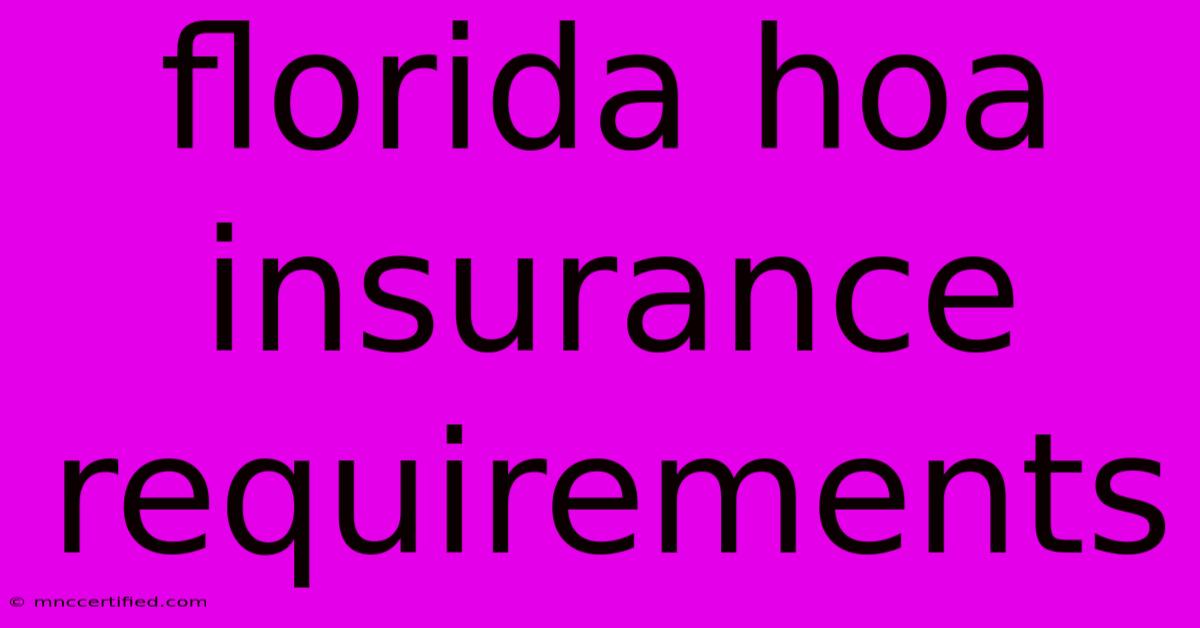Florida Hoa Insurance Requirements

Table of Contents
Florida HOA Insurance Requirements: A Comprehensive Guide
Florida's vibrant community landscape thrives on its numerous homeowner's associations (HOAs). These organizations play a crucial role in maintaining property values and community standards. However, navigating the complex world of HOA insurance requirements can be daunting. This comprehensive guide clarifies Florida's HOA insurance mandates, helping you understand your responsibilities and avoid costly mistakes.
Understanding Florida HOA Insurance: Key Coverages
Florida law doesn't explicitly define a single, standardized HOA insurance policy. Instead, it emphasizes the need for adequate coverage to protect the association's assets and interests. The specific insurance requirements often depend on the HOA's governing documents, the type of community (condominiums, cooperatives, or planned communities), and the specific risks involved. However, several key coverages are typically required or highly recommended:
1. Property Insurance:
This is arguably the most crucial coverage for any Florida HOA. It protects the association's common areas – buildings, amenities, landscaping, and other shared property – from damage caused by covered perils like fire, windstorms, and hail. Given Florida's susceptibility to hurricanes, comprehensive windstorm coverage is paramount. Flood insurance, while often separate, is also highly recommended, especially in flood-prone zones. Ensuring your HOA has sufficient property insurance coverage is critical for financial stability in the event of a catastrophic event.
2. Liability Insurance:
This coverage protects the HOA from financial losses due to lawsuits arising from accidents or injuries on common property. For example, a slip and fall on an icy walkway or a visitor injured at a community pool could lead to significant liability claims. Adequate liability insurance safeguards the HOA's financial health and protects its directors and officers from personal liability. Umbrella liability insurance provides an extra layer of protection beyond the basic liability policy.
3. Directors and Officers (D&O) Liability Insurance:
This protects HOA board members from personal liability related to their decisions and actions while serving on the board. Lawsuits against board members are not uncommon, and D&O insurance provides crucial financial protection against potential legal costs and judgments.
4. Workers' Compensation Insurance:
If the HOA employs staff, workers' compensation insurance is mandatory. It covers medical expenses and lost wages for employees injured on the job. Failure to maintain this coverage can result in severe penalties.
Determining Your HOA's Specific Insurance Needs
While the above coverages are common, the exact requirements will be outlined in your HOA's governing documents, including the covenants, conditions, and restrictions (CC&Rs), bylaws, and insurance declarations. Carefully review these documents to understand your HOA's specific insurance obligations. Consult with an experienced Florida HOA insurance specialist to ensure you have the right coverage at the right limits. They can help you assess your community's unique risks and recommend appropriate policy adjustments.
Navigating Insurance Claims and Disputes
Even with proper insurance coverage, navigating the claims process can be challenging. Understanding your HOA's insurance policy, including its deductible and coverage limits, is vital. Maintain clear and detailed records of all incidents and claims. Engage with your insurance provider promptly and follow their instructions carefully. Should disputes arise, consider seeking legal counsel to protect your HOA's interests.
The Consequences of Inadequate HOA Insurance
Failing to maintain adequate insurance coverage exposes your HOA to significant financial risks. In the event of a major incident, such as a hurricane or a major lawsuit, inadequate insurance can lead to:
- Special assessments: These are extra fees levied on homeowners to cover unexpected costs, potentially causing financial hardship for residents.
- Foreclosure: In extreme cases, insufficient funds to cover damages could lead to foreclosure on the common property.
- Legal liabilities: Board members could face personal liability for insufficient insurance coverage.
In conclusion, understanding and meeting Florida's HOA insurance requirements is non-negotiable. Proactive planning, informed decision-making, and regular review of your insurance policies are crucial for protecting your community's financial well-being and maintaining its value. Don't hesitate to seek professional advice to ensure your HOA is adequately protected.

Thank you for visiting our website wich cover about Florida Hoa Insurance Requirements. We hope the information provided has been useful to you. Feel free to contact us if you have any questions or need further assistance. See you next time and dont miss to bookmark.
Featured Posts
-
Davina Mc Calls Diagnosis Showing Support
Nov 16, 2024
-
Wicked Star Erivos Outsider Story
Nov 16, 2024
-
Long Term Care Insurance Tennessee
Nov 16, 2024
-
Carnation Revolution Icon Passes
Nov 16, 2024
-
Iowa Crop Insurance Planting Dates
Nov 16, 2024